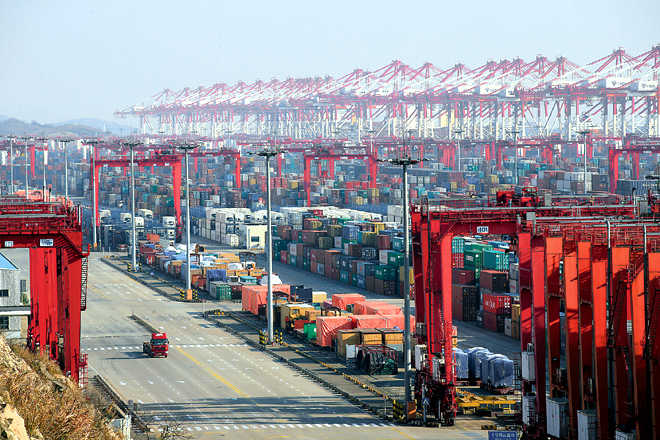
No spoils: Unless trade becomes freer, it’ll not be possible to ensure viability of industries.
Sushma Ramachandran
War in the 21st century has metamorphosed into different arenas. From conventional warfare, it has moved to cyber wars, where attacks are made on the computer systems now running every country’s economy. US President Donald Trump has unleashed yet another type of battle on the global stage — trade wars. In a bid to play to his domestic constituency of blue-collar workers worried over factories closing and shifting to emerging economies, Mr Trump is imposing protectionist tariffs on critical industrial raw materials.
The aim ostensibly is to ensure that domestic industries thrive and create more jobs. His protectionist agenda began with refusing to participate in the proposed regional trade agreement, the Trans Pacific Partnership (TPP), which he felt was unfair to the US. He then sought renegotiation of the longstanding North American Free Trade Agreement (NAFTA) with Canada and Mexico. And now, finally, he has imposed tariffs of 25 and 10 per cent, respectively, on steel and aluminium imports, shortly after raising import duties on washing machines and solar panels.
The problem is the tariff hike may end up harming the US economy rather than the exporting countries. A similar spike in tariffs in 2002 during the tenure of President George Bush had the unintended effect of leading to a steep increase in steel and aluminium prices. This hurt many small businesses and even led to their closure. In other words, it led to job losses rather than job creation.
Besides, there has been a fundamental shift in the focus of that country’s economy from manufacturing to the services sector. The services sector now accounts for as much as 80 per cent of GDP, reducing the importance of the manufacturing sector.
Despite these factors, Trump has gone ahead with the new policy which is now likely to invite retaliation from affected countries. In other words, trade wars are on the horizon. The European Union is talking about high levies on orange juice and jeans while China could be mulling higher tariffs on soyabeans. The actual impact of the higher levies should have been on Canada which is the biggest supplier of both metals to the US. But for the time being, these are not being imposed on imports from neighbours like Canada and Mexico, though there is no clarity if this concession is going to continue in the long run.
Clearly, retaliatory tariffs by other countries will lead to similar increases by the US. It is already raising concerns about trade barriers imposed by other countries with which there are trade deficits, of which the biggest is China. But India also has a trade deficit, though it may be tiny in comparison — $23 billion dollars as compared to $375 billion with China. Nonetheless, Trump has been vocal in recent days over high tariff barriers over here. Notably, he made a song and dance about the steep hike in import duties on Harley-Davidson motorcycles, an item that is exported in small quantities to this country.
It is evident, therefore, that India is willy-nilly set to be part of the trade wars. In the case of steel and aluminium exports to the US, this country has little role to play, given the fact that it only supplies about 2 per cent of that country’s requirements. But there are other products on which higher tariffs can hurt us.
At the same time, India can equally be accused of being protectionist as it has recently raised import duties on a range of goods in the electronics industry. Just like the ‘America First’ slogan of the current US administration, the Modi government too has its ‘Make in India’ policy. This has prompted a rise in import duties on a host of electronic goods components that may make many products more expensive for Indian consumers. Television producers, for instance, are threatening to shut down owing to high cost of some key components. So, India is not blameless in this competitive game of protectionism now being played out throughout the world.
It will now have to watch out as there are many other products on which increased tariffs by the US could impact India. This includes the biggest export sectors of gems and pharmaceuticals. For the time being, therefore, India would be well advised to join the countries that may seek to form a joint front against the US on its trade aggression. The EU and China, for instance, have much larger volumes of trade with the US and the stakes are very high for both of them. India is a smaller player, but even so, the US market is a critical one and it can ill afford to lose access to it owing to Trump’s protectionist drive.
What is also worrying is that there is an attempt to bypass the multilateral World Trade Organisation which was set up precisely to deal with such global trade disputes. The current increase in tariffs goes beyond the limits prescribed by the WTO. India is already involved in several disputes with the US at the trade body over its export promotions schemes as well as solar panel duties. This is apart from the fact that it has attracted the ire of most developed countries by rightly refusing to budge on issues relating to agriculture owing to the need to ensure the interests of Indian farmers are not sacrificed at the world body.
Thus despite the growing closeness in strategic ties between India and the US, there is a definite strain as far as trade issues are concerned. The trade war launched by the US is not directed at India right now, but frictions are growing over tariff and non-tariff barriers between both countries. The international battle to ensure that each country is able to provide enough jobs for its people is at the heart of this protectionist war. The fact is, however, that unless trade becomes freer, it will not be possible to ensure that industries become more viable and efficient, and hence are able to offer more jobs. Trade wars may do just the reverse by raising costs of products across the board and making businesses uncompetitive everywhere. These wars will not have a happy ending, as is the case with all global conflicts, so one can only hope a truce is achieved before the battle begins in right earnest.



























